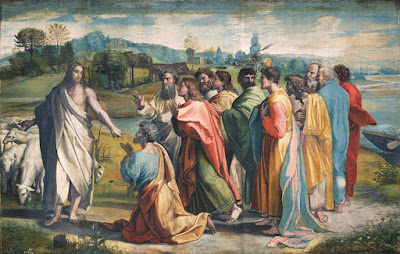'Christ's charge to Peter' (Raphael)
There are two places in Scripture where the curious detail of a “charcoal fire” is mentioned. One is in today’s Gospel, where the Apostles return from fishing to find bread and fish warming on the fire. The other is in the scene in the High Priest’s courtyard on Holy Thursday, where Peter and some guards and slaves warm themselves while Jesus is being interrogated inside (see John 18:18). At the first fire, Peter denied knowing Jesus three times, as Jesus had predicted (see John 13:38; 18:15-18, 25-27).
The Denial of Peter (Carl Heinrich Bloch, 1873)
Today’s charcoal fire becomes the scene of Peter’s repentance, as three times Jesus asks him to make a profession of love. Jesus’ thrice repeated command “Feed My sheep” shows that Peter is being appointed as the Shepherd of the Lord’s entire flock, the head of his Church (see also Luke 22:32). Jesus’ question: “Do you love me more than these?” is a pointed reminder of Peter’s pledge to lay down his life for Jesus, even if the other Apostles might weaken (see John 13:37; Matthew 26:33; Luke 22:33).
Jesus then explains just what Peter’s love and leadership will require, foretelling Peter’s death by crucifixion (“you will stretch out your hands”). Before his own death, Jesus had warned the Apostles that they would be hated as he was hated, that they would suffer as he suffered (see Matthew 10:16-19,22; John 15:18-20; 16:2).
The Crucifixion of Saint Peter (Ventura Salimbeni)
In Greek there are several different words translated by the one English word love. C.S. Lewis wrote wittily about them in “The Four Loves”. There is Storgé (affection) the quiet liking you might have for a neighbour who is agreeable and with whom you occasionally share a pleasantry. There is eros, a sensual or erotic love, the kind of love that can bond a couple along with their friendship and often leads to marriage. Then there is philia, meaning friendship, the admiring companionship we feel toward people with whom we share some significant interests. Finally there is agapé, which is largely generous and self-giving love, even when there is nothing tangible to be gained. (These are just generalised definitions and are not verified in every case for each of these terms). Like Peter, God wants us to love him. Can we do that in the sense of agape love – unselfish, all-giving? It is tough but we must work at truly loving God.
As usual our latest Newsletter can be found by following the link the left-hand sidebar, or here.



No comments:
Post a Comment